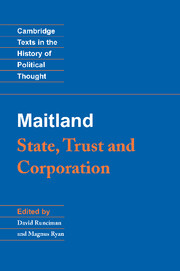Book contents
- Frontmatter
- Contents
- Acknowledgements
- Editors' introduction
- Note on the text
- Bibliographical notes
- Biographical notes
- Glossary of technical terms
- Preface
- The Essays
- 1 The Corporation Sole
- 2 The Crown as Corporation
- 3 The Unincorporate Body
- 4 Moral Personality and Legal Personality
- 5 Trust and Corporation
- Index
- Cambridge Texts in the History of Political Thought
3 - The Unincorporate Body
Published online by Cambridge University Press: 05 June 2012
- Frontmatter
- Contents
- Acknowledgements
- Editors' introduction
- Note on the text
- Bibliographical notes
- Biographical notes
- Glossary of technical terms
- Preface
- The Essays
- 1 The Corporation Sole
- 2 The Crown as Corporation
- 3 The Unincorporate Body
- 4 Moral Personality and Legal Personality
- 5 Trust and Corporation
- Index
- Cambridge Texts in the History of Political Thought
Summary
Of the Taff Vale Case we are likely to hear a good deal for some time to come. The trade unions are not content; there will be agitation; perhaps there will be legislation.
To one reader of English history and of English law it seems that certain broad principles of justice and jurisprudence are involved in and may be evolved from the debate: certain broad principles which extend far beyond the special interests of masters and workmen. Will he be able to persuade others that this is so? Can he assign to this Taff Vale Case its place in a long story?
Of late years under American teaching we have learned to couple together the two terms ‘corporations’ and ‘trusts’. In the light of history we may see this as a most instructive conjunction. And yet an apprentice of English law might well ask what the law of trusts has to do with the law of corporations. Could two topics stand farther apart from each other in an hypothetical code? Could two law-books have less in common than Grant on Corporations and Lewin on Trusts?
To such questions English history replies that, none the less, a branch of the law of trusts became a supplement for the law of corporations, and some day when English history is adequately written one of the most interesting and curious tales that it will have to tell will be that which brings trust and corporation into intimate connexion with each other.
- Type
- Chapter
- Information
- Maitland: State, Trust and Corporation , pp. 52 - 61Publisher: Cambridge University PressPrint publication year: 2003
- 2
- Cited by



